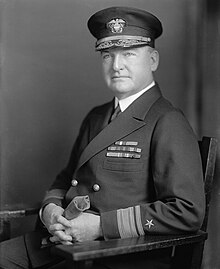Luke McNamee | |
|---|---|
 | |
| 21st President of the Naval War College | |
| In office June 3, 1933 – May 29, 1934 | |
| Preceded by | Harris Laning |
| Succeeded by | Edward C. Kalbfus |
| 21st Director of the Office of Naval Intelligence | |
| In office September 1921 – November 1923 | |
| Preceded by | Andrew T. Long |
| Succeeded by | Henry Hughes Hough |
| 12th Naval Governor of Guam | |
| In office October 3, 1907 – December 28, 1907 | |
| Preceded by | Templin Potts |
| Succeeded by | Edward John Dorn |
| 10th Naval Governor of Guam | |
| In office November 2, 1905 – December 3, 1906 | |
| Preceded by | George Leland Dyer |
| Succeeded by | Templin Potts |
| Personal details | |
| Born | August 4, 1871 Mount Hope, Wisconsin, U.S. |
| Died | December 30, 1952 (aged 81) Newport, Rhode Island, U.S. |
| Nationality | |
| Spouse | Dorothy Swinburne McNamee |
| Relatives | William T. Swinburne (father-in-law) |
| Awards | Navy Cross Legion of Honour |
| Military service | |
| Allegiance | |
| Branch/service | |
| Rank | |
| Commands | |
Luke McNamee (April 4, 1871 – December 30, 1952)[1] was a United States Navy Admiral, businessman, and the 10th and 12th Naval Governor of Guam. He served in the navy for 42 years, during which time he held multiple commands. During the Spanish–American War, he earned the Navy Cross, and later the Legion of Honour.
Earlier on his career, he served as governor, and expanded funding for fighting the infectious diseases running through the native population. He represented the U.S. Navy as a delegate to the Paris Peace Conference in 1919. He later became Director of the Office of Naval Intelligence. He was promoted to full admiral after being placed in charge of the Battle Fleet. After this command, he served as President of the Naval War College before retiring in 1934. After leaving the navy, he became president and Chairman of the Mackay Radio and Telegraph Company, where he aggressively expanded telegraph and radio service overseas.
- ^ Hooper, Franklin Henry; Yust, Walter (1953). "Britannica book of the year". books.google.co.uk. Retrieved March 25, 2012.